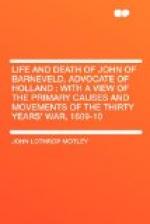The great peculiarity of the Dutch constitution at this epoch was that no principle was absolutely settled. In throwing off a foreign tyranny and successfully vindicating national independence the burghers and nobles had not had leisure to lay down any organic law. Nor had the day for profound investigation of the political or social contract arrived. Men dealt almost exclusively with facts, and when the facts arranged themselves illogically and incoherently the mischief was grave and difficult to remedy. It is not a trifling inconvenience for an organized commonwealth to be in doubt as to where, in whom, and of what nature is its sovereignty. Yet this was precisely the condition of the United Netherlands. To the eternal world so dazzling were the reputation and the achievements of their great captain that he was looked upon by many as the legitimate chief of the state and doubtless friendly monarchs would have cordially welcomed him into their brotherhood.
During the war he had been surrounded by almost royal state. Two hundred officers lived daily at his table. Great nobles and scions of sovereign houses were his pupils or satellites. The splendour of military despotism and the awe inspired by his unquestioned supremacy in what was deemed the greatest of all sciences invested the person of Maurice of Nassau with a grandeur which many a crowned potentate might envy. His ample appointments united with the spoils of war provided him with almost royal revenues, even before the death of his elder brother Philip William had placed in his hands the principality and wealthy possessions of Orange. Hating contradiction, arbitrary by instinct and by military habit, impatient of criticism, and having long acknowledged no master in the chief business of state, he found himself at the conclusion of the truce with his great occupation gone, and, although generously provided for by the treasury of the Republic, yet with an income proportionately limited.
Politics and theology were fields in which he had hardly served an apprenticeship, and it was possible that when he should step forward as a master in those complicated and difficult pursuits, soon to absorb the attention of the Commonwealth and the world, it might appear that war was not the only science that required serious preliminary studies.
Meantime he found himself not a king, not the master of a nominal republic, but the servant of the States-General, and the limited stadholder of five out of seven separate provinces.
And the States-General were virtually John of Barneveld. Could antagonism be more sharply defined? Jealousy, that potent principle which controls the regular movements and accounts for the aberrations of humanity in widest spheres as well as narrowest circles far more generally and conclusively than philosophers or historians have been willing to admit, began forthwith to manifest its subtle and irresistible influence.




